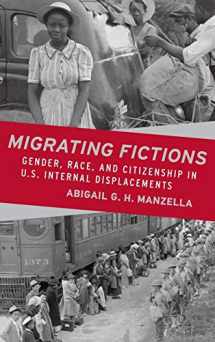
Migrating Fictions: Gender, Race, and Citizenship in U.S. Internal Displacements
ISBN-13:
9780814213582
ISBN-10:
0814213588
Edition:
1
Author:
Publication date:
2018
Publisher:
Ohio State University Press
Format:
Hardcover
264 pages
FREE US shipping
Book details
ISBN-13:
9780814213582
ISBN-10:
0814213588
Edition:
1
Author:
Publication date:
2018
Publisher:
Ohio State University Press
Format:
Hardcover
264 pages
Summary
Migrating Fictions: Gender, Race, and Citizenship in U.S. Internal Displacements (ISBN-13: 9780814213582 and ISBN-10: 0814213588), written by authors
, was published by Ohio State University Press in 2018.
With an overall rating of 4.4 stars, it's a notable title among other
books. You can easily purchase or rent Migrating Fictions: Gender, Race, and Citizenship in U.S. Internal Displacements (Hardcover) from BooksRun,
along with many other new and used
books
and textbooks.
And, if you're looking to sell your copy, our current buyback offer is $0.41.
Description
Migrating Fictions analyzes the role of race, gender, and citizenship in the major internal displacements of the 20th century in history and in narrative. Surveying the particular tactics employed by the United States during the Great Migration, the Dust Bowl, the Japanese American incarceration, and the migrant labor of the Southwest, Abigail G. H. Manzella reveals how the country’s past is imbued with governmentally (en)forced movements that diminished access to full citizenship rights for the laboring class, people of color, and women.
This work is the first book-length study to examine all of these movements together along with their literature, including Zora Neale Hurston’s Their Eyes Were Watching God, Sanora Babb’s Whose Names Are Unknown, Julie Otsuka’s When the Emperor Was Divine, Helena María Viramontes’s Under the Feet of Jesus, and Jesmyn Ward’s Salvage the Bones. Manzella shows how the United States’ history of spatial colonization within its own borders extends beyond isolated incidents into a pattern based on ideology about nation-building, citizenship, and labor. This book seeks to theorize a Thirdspace, an alternate location for social justice that acknowledges the precarity of the internally displaced person.


We would LOVE it if you could help us and other readers by reviewing the book
Book review

Congratulations! We have received your book review.
{user}
{createdAt}
by {truncated_author}


